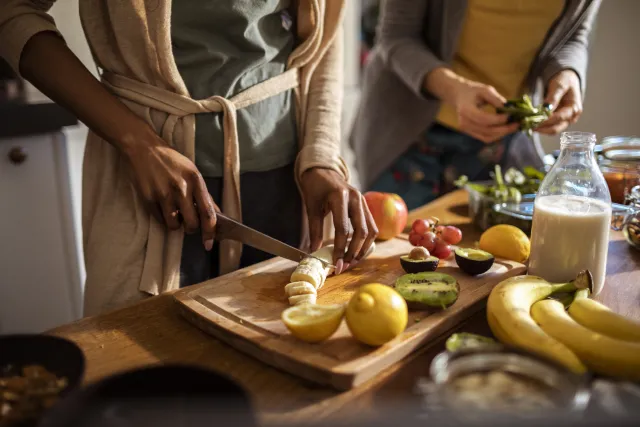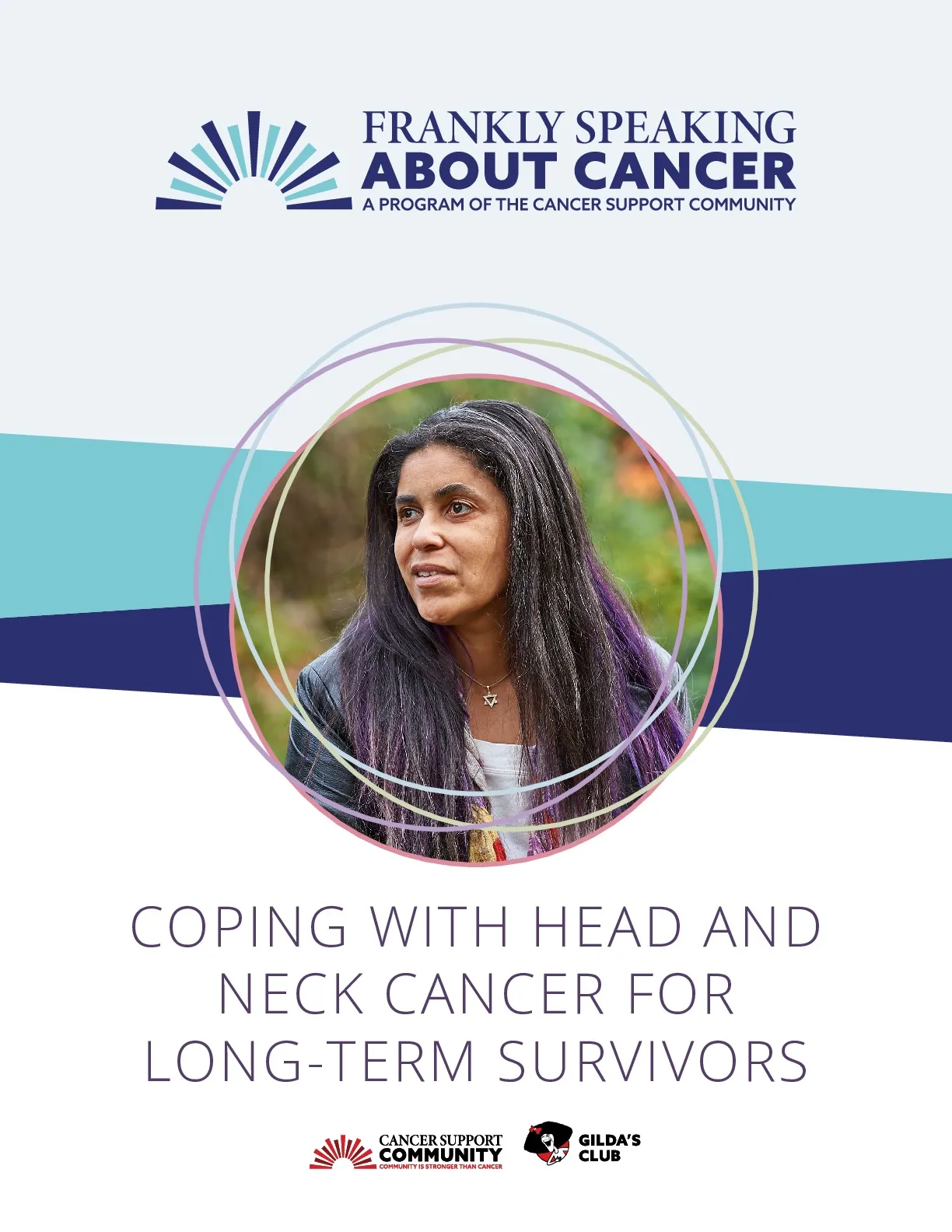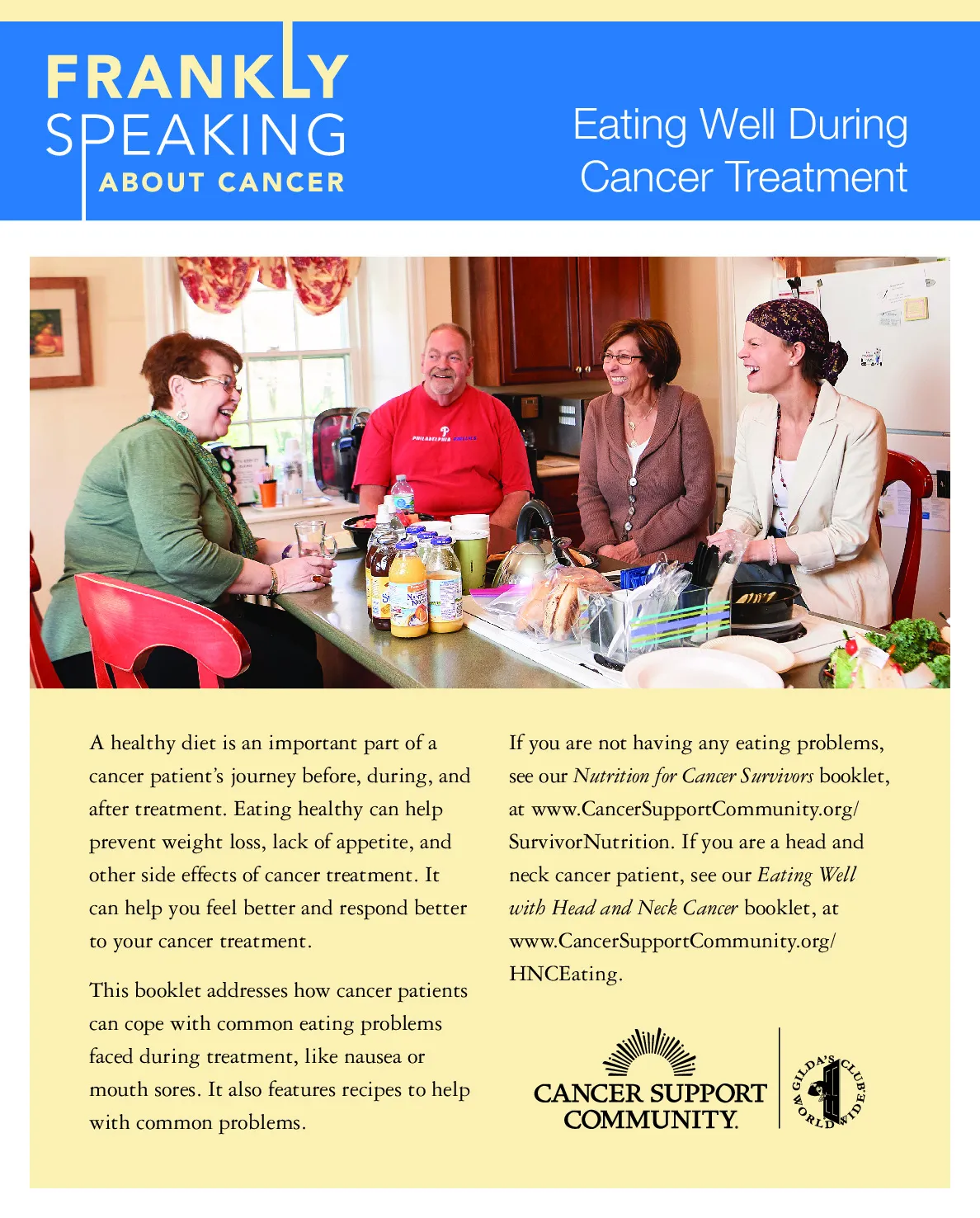Coping With Health Concerns
Table of Contents

A cancer diagnosis can make it hard to maintain a healthy diet and an active lifestyle. You may experience fatigue or face eating challenges related to your treatment. However, many benefits come with staying active and maintaining good nutrition during and after cancer treatment. Tobacco or substance use may also be a concern when coping with cancer. Discover how to create a customized exercise plan, address fatigue and eating challenges, and maintain a healthy lifestyle.
Changes in the Ability to Exercise
After receiving a cancer diagnosis and treatment, you may worry that you are not moving around as well as you would like. Things like walking, climbing stairs, and lifting things may feel harder to you now. Some of these limitations may be temporary, others more long-lasting. Either way, it is important that you talk to your doctor about starting or restarting an exercise program. There are things that you can do to stay active and feel better both physically and mentally.
Know Your Limits
Exercise or physical activity can be an important part of improving your physical and emotional health during and after treatment. It is important to set realistic goals. Consider your treatment schedule, time available, how you feel on any given day, and other factors. Try to make exercise a priority. This will help you feel stronger, sleep better, and improve your mood.
Remember that you don’t need to run a marathon. Some days even sitting in a chair instead of lying in bed will be as much activity as you can do. Cleaning the house, walking the dog, or stretching are also forms of exercise. Recent research shows that physical activity may even lower the chance of your cancer coming back.
Healing Light Meditation
Healing Light Meditation is a guided meditation that uses breath, visualization and intention to call upon healing within. As you follow along, truly believe in the practice and you shall receive. Meditation is like a mirror that polishes the…
Customize Your Exercise Plan
Customized exercise is about changing an exercise movement to fit how you feel on a given day. It also means changing the exercise to accommodate for any physical or other limitation you may have. You will feel very different immediately after completing treatment than you will months or years later. You can still exercise at any point during that time, but the way that you exercise should look different. At first you might walk very slowly from the couch to the mailbox and back. A month later, you might have the energy to walk slowly around the block. A year later, you might walk around the block 4 times.
Activities such as cleaning or gardening also count as exercise. You may not feel physical exertion, but that effort is still good for you, no matter how small. Exercise can make you feel better, even if you felt nauseated, exhausted, or sad before you did it. The following suggestions will help you “read” how you feel at any given moment, and then customize exercise to match your feeling:
- If you feel sick, exercise may help decrease nausea. Exercise when you feel sick should be gentle, slow, and brief.
- If you are fatigued or extremely tired, exercise may give you energy (if it is gentle, slow, and brief). You can always do more on a day when you are not so tired.
- If you are not sleeping well at night, exercise during the day may help you sleep better.

Visit Our Mind Body Studio
Explore our collection of yoga lessons, gentle exercises, and meditation videos designed with the needs of people impacted by cancer in mind.
Fatigue
Nearly everyone who is treated for cancer reports feeling too tired to do what they need or want to do, at times. Cancer-related fatigue is a feeling of tiredness that may have little to do with your physical activity or amount of sleep. Feeling too tired does not mean that the cancer is getting worse or that the treatment is not working. In fact, part of your fatigue may be due to your body and the treatment working together to get rid of the cancer. There are many causes of fatigue during treatment and even after treatment ends. Fatigue can be emotional or physical. Understanding the cause of your fatigue will help you and your healthcare team develop a plan to manage it.
Fatigue can be hard to cope with. It can affect your physical, mental, social, and even financial well-being. The reality is that you will have good days and not-so-good days. This is a normal part of cancer recovery.
It is common to feel too tired to do the things you need and want to do during and after cancer treatment. Usually, fatigue comes on gradually during treatment. After treatment, it will likely fade away slowly over time. Once treatment ends, you should be able to return to your usual activity level, especially if you work with your healthcare provider to stay on top of this concern.
Coping with Fatigue
Emotional Fatigue
Anxiety, depression, worry, fear, and other emotional stress can contribute to feeling tired. Reducing your stress and worry can help you feel more energetic. Allow yourself to rest when you are most tired. Be active when you feel up to it. Focus on getting regular sleep. If you are constantly struggling to fall or stay asleep, talk to your healthcare provider.
Physical Fatigue
Other causes of fatigue can include things like chemotherapy, radiation, surgery, low blood counts, pain, changes in nutrition, medications, and anemia. Understanding which of these is causing your fatigue will help you and your healthcare team come up with a plan.
Fatigue and Work
If you have cancer-related fatigue and are continuing to work, you may be able to ask your employer for changes that make working easier for you. You do not need to tell your employer that you have cancer, but you will have to let them know that you have a medical condition. Get tips on how to talk to your employer.
Communication Is Key
Good communication with your healthcare team will help you find the cause(s) of your fatigue and create solutions. Be kind to yourself. Know that you are going through a challenging time and that your mind, body, and spirit are working hard through the cancer experience to find health and wellness. Time may be the best solution for treatment-related fatigue.
Eating and Nutrition Challenges
Good nutrition is an important part of any healthy lifestyle, but a cancer diagnosis can make it difficult to maintain a healthy diet and proper eating habits. Depending on the type of treatment you receive, you may experience nausea, fatigue, vomiting, loss of appetite, depression, stress, or other side effects. These side effects can impact your treatment course and your quality of life. If you are concerned about side effects that are impacting eating and overall nutrition, talk to your doctor or dietitian for assistance.
It is not unusual to only remember physical symptoms (like nausea) because they are most obvious to you and those around you. However, it is also important to take notice of any emotional or other factors that might affect your appetite. Though it is easier said than done, eating properly, and understanding how your nutrition affects your cancer experience can make a difference during treatment and recovery.
There is no “one-size-fits-all” recommendation on diet and nutrition for people who have cancer. Treatment and its side effects may change the way your body processes food. You may need more of a certain kind of food than you did before. You may be told to avoid other foods because they are more likely to cause symptoms.
Tips to Manage Your Nutrition
Your nutrition is an important part of your cancer treatment. Good nutrition is especially important when your body is fighting a disease. Healthy eating can help you:
- Get the nutrition you need
- Tolerate the side effects of treatment
- Lower your risk of infection
- Prevent and manage other health problems such as diabetes, high blood pressure, and osteoporosis
- Maintain a healthy weight
- Feel your best
Here are additional tips to help you better manage eating and nutrition:
- Talk to Your Healthcare Providers
- Voice Your Opinion About Your Food
- Eat When and Where You Are Comfortable
- Keep a Journal
- Talk to a Registered Dietitian
This is the first step to eating healthier. Your healthcare team understands your needs and can let you know which foods to eat more of or avoid based on your diagnosis, lifestyle, treatment plan, and food preferences.
Your desire to eat may decrease due to the side effects of cancer treatment. So, it is important to eat healthy but also eat things that you enjoy.
If there is a specific place in your home that might make eating easier or more pleasant, try to go to those areas during mealtimes as much as possible. Your appetite might vary from those of your family members, which might make your mealtimes different from their mealtimes. Ask a family member to sit with you or adjust family mealtime so that you don’t always have to eat alone.
A journal is not only essential to keeping track of your other symptoms, but it is a great tool to assist in the tracking of your diet. This can help you and your family keep up with your eating schedule and preferences. It might also help you to connect any changes you have in your diet with new treatment, physical, or emotional changes.
Your cancer center or doctor will most likely have a registered dietitian who can sit down with you and help you create an eating plan that works best for you. Beware of nutritional scams or products that promise to cure cancer through nutrition or nutritional supplements. A registered dietitian, doctor, or nurse is the best expert to discuss important aspects of managing your diet or any dietary supplements.
Here are some other ways you can manage your nutrition:
- When you just don’t feel like eating, consider drinking a liquid or powdered meal replacement (such as “instant breakfast”).
- Consider eating 5 or 6 small meals each day instead of 3 large meals. You can also eat smaller amounts at any one time. This can keep you from feeling too full and may help reduce nausea.
- Keep snacks nearby for when you feel like eating. Take easy-to-carry snacks such as peanut butter crackers, nuts, granola bars, or dried fruit when you go out.
- Find ways to add extra protein and healthy calories to your diet.
- Drink liquids throughout the day — even when you do not want to eat. Choose liquids that add calories and other nutrients such as juice, soup, milk, and soy-based drinks with protein.
- Try eating a light bedtime snack. This will give extra calories but won’t affect your appetite for the next meal.
- Change the form of the food. For instance, you might make a fruit milkshake or smoothie instead of eating a piece of fruit.
- Eat soft, cool, or frozen foods. These include yogurt, milkshakes, and popsicles.
- Eat larger meals when you feel well and are rested. For many people, this is in the morning after a good night’s sleep.
- Sip only small amounts of liquids during meals. Many people feel too full if they eat and drink at the same time. If you want more than just small sips, have a larger drink at least 30 minutes before or after meals.

Browse Our Recipe Gallery
Explore nutritious recipes for breakfast, lunch, dinner, and snacks in our recipe gallery.
Concerns About Tobacco and Substance Use
The cancer experience is stressful. If you smoke or use other substances, it may be a hard time to think about stopping. Other substances may include alcohol, drugs, or medications not prescribed for you. However, using tobacco and other substances may harm you and those around you. People with cancer who stop smoking or seek treatment for substance use experience many benefits. Your cancer treatment, overall health, and quality of life may improve. If you smoke or use any other substances, it is important to tell your healthcare team. Be honest about your tobacco or substance use, even if you are not interested in stopping. If you do want to stop, your healthcare team can help you.
Smoking and Tobacco Use
Quitting smoking at any time will improve your overall health and quality of life. Studies show that the longer the length of time between stopping smoking and starting cancer treatment, the better your chance of recovery. Studies also show that stopping smoking after a cancer diagnosis can lower the risk of treatment side effects and developing a second cancer.
To quit smoking, talk with your healthcare team about your tobacco use. Understanding your situation can help them find the right resources and support for you. Your doctor may refer you to a certified smoking cessation counselor or a mental health counselor.
Alcohol, Prescription, or Illegal Drug Use
To come up with the best treatment and manage side effects, it’s important that you are honest with your healthcare team. Tell them about your history of using alcohol and other drugs, especially illegal substances. Even if your healthcare team does not ask you about your use of alcohol and other drugs, you should bring it up. Drugs and alcohol can keep other medications you take from working their best. They may interact negatively with your cancer treatment.
You should not worry that you will be denied cancer treatment if you tell them about your substance use. Your team may encourage you to try to stop or limit your use of these substances. They want you to get the most benefit from treatment while limiting side effects. If you want to stop or cut back your use of alcohol or drugs, your healthcare team will help you find treatment in your area.
The following organizations can also help:

Contact Our Helpline
We offer free navigation for cancer patients or their loved ones.
Frankly Speaking About Cancer Library
LibraryWould you like a print copy of these educational materials?
We can mail our Frankly Speaking About Cancer pieces to you. Shipping is free for up to 20 pounds.

